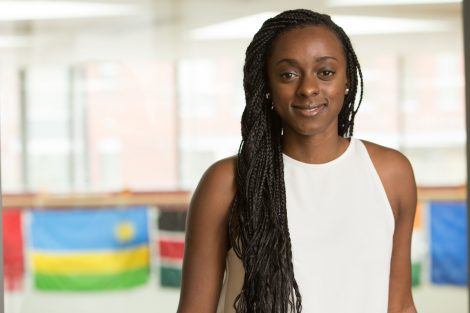Tayeisha Jackson, DrPH ’18, wants to help humanitarian organizations improve the quality of the programs they offer to people in need
May 23, 2018 – When Tayeisha Jackson first heard about Doctors Without Borders at age 12, she pictured herself working with them in conflict zones, saving lives in the face of danger. Born in Jamaica and raised on U.S. military bases around the world, she identified with people who had been displaced by war and disaster, and wanted to help. This week, she’ll graduate with a DrPH from Harvard T.H. Chan School of Public Health, with a concentration in Humanitarian Studies, Ethics, and Human Rights. And she’s learned that emergency medicine isn’t the only path to humanitarian work.
“I want to support agencies in better understanding and meeting community needs. I want to be the person that identifies gaps in what programs are providing and who gathers data to see how quality can be improved,” she said. She’s just recently back from spending seven months in Ethiopia, where she worked with an international humanitarian organization and conducted research for her thesis. There, she delved into the ways that attitudes around gender at an organization can affect the programs it offers to the population it serves. The work spoke to both her humanitarian heart and analytical mind.
At the request of the organization, Jackson helped conduct a survey of its staff in Ethiopia. She and her colleagues found that there were few women in leadership roles, and that men with higher education, who tended to be in managerial positions, had some of the most regressive attitudes regarding women’s capabilities and roles—results that garnered “shock but not complete surprise,” she said. She was asked to extend her stay by one month to help the agency develop a plan for improvement.
Working with staff in the field, Jackson observed that the organization’s limited consideration of gender was reflected in its services. For example, women were expected to travel lengthy distances to pick up food aid at times when they were busy with responsibilities in their homes and communities. Jackson urged staff to acknowledge the distinct needs of women and girls—and men and boys—in the organization’s programs to ensure that it achieved its mission. Ways she suggested they do this included consulting with women and girls when designing and monitoring emergency relief programs and encouraging fathers to be more involved in childcare. She also promoted open conversations around issues such as female genital mutilation, child marriage, and affirmative action. Some staff members were receptive to her suggestions, but others accused her of imposing Western values on their culture.
“I responded openly when I got pushback,” Jackson said. “The big key I learned was not making it personal. I kept the focus on how equality will increase prosperity and benefit the community.”
Refuge in academics
Jackson learned how to advocate for issues she believes in during her chaotic childhood. Threats were a constant presence in her life at that time. She recalled hiding under her desk at school during bombing alerts. But school also became a refuge, as teachers recognized her talents and opened the door to opportunities such as speech and debate training and Model United Nations.
She was also inspired by the courage of those who help in the face of danger, soaking up the combat stories of military doctors. Before college, and on breaks from Worcester Polytechnic Institute—where she earned a BS in biology and biotechnology—Jackson volunteered as an emergency department assistant.
She intended to go on to medical school, but became conflicted when she discovered that she also loved teaching. After graduation, she decided to apply for Teach for America, and was assigned to teach sixth grade science at a school in Oakland, California.
Jackson threw herself into the role for two years, taking on extra responsibilities such as working with girls as a soccer coach and advising a technology club where students designed mobile apps to address community problems. But it was hard to make a difference in the face of the challenges students were facing at home and in their neighborhoods, she said.
“I still love teaching, but I realized that my heart is in health. That’s where I can make the greatest impact,” she said. After a stint as a data analyst at Emory Healthcare in Atlanta, Jackson decided to go back to school.
At Harvard Chan School, Jackson was inspired by professors like Stephanie Kayden, associate professor in the Department of Global Health and Population, who combine teaching and medicine with frontline humanitarian work. She took advantage of a range of opportunities to learn about the field, from attending—and later volunteering with—the Harvard Humanitarian Initiative’s annual humanitarian response simulation, developing an independent study in disaster services with the American Red Cross, and taking a Harvard Graduate School of Education course on teaching in conflict settings.
Although her life as a humanitarian worker isn’t quite what she imagined when she was a kid—she still hasn’t saved anyone’s life on the battlefield—she’s happy to have found a way to make an impact. “I feel very blessed to have been able to come here,” she said. “Now I want to take everything that the School has taught me and do some good in the world.”
Photo: Sarah Sholes
